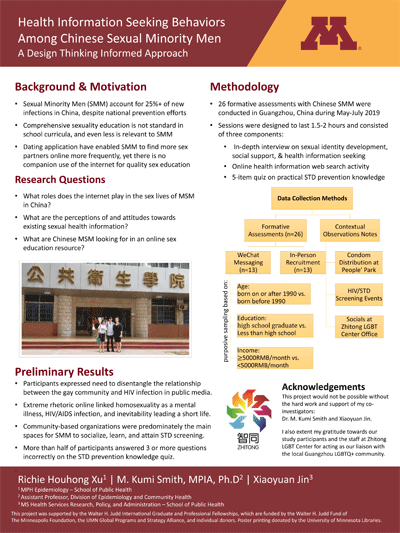Richie Houhong Xu
MPH, Epidemiology
Co-Authors:
M Kumi Smith, Xiaoyuan (Sharon) Jin
Advisor:
Dr. M Kumi Smith
Abstract
Background: Despite the provision of free HIV testing services and other efforts to strengthen HIV prevention by the Chinese government, HIV incidence has remained unacceptably high in China1–3. In previous studies examining the barriers and facilitators to HIV prevention and treatment, Chinese men who have sex with men (MSM) have expressed that existing sex education is non-specific to MSM, not comprehensive, and did not resonate with them4,5. Despite calls for stronger education programs that are closer aligned to the needs of the Chinese MSM community, there is little researching into their diversity of experiences and health information seeking behaviors. Our study aims to assess current attitudes towards existing sources of health information in China and explore ways to improve the information disparity for Chinese MSM.
Methods: Participants were recruited online through WeChat, China’s most popular messaging and social media application, and in-person during community outreach events hosted by Zhitong LGBT Center, a community-based organization for LGBTQ health and advocacy based in Guangzhou, China. Among participants recruited through WeChat, purposive sampling was used to capture a diverse body of experiences and perspectives based on education level, age, and income. Interviews were designed to last 1.5-2 hours and covered topics relating to sexual identity development, social organizations and support, and experiences with searching for health information. A 5-item quiz assessing practical STD prevention knowledge was also administered at the end of the interview.
Results: 26 interviews were conducted between May 2019-July 2019. Participants expressed the need to disentangle the relationship between the gay community and HIV transmission in public media. Furthermore, homosexual behaviors are commonly seen as a mental illness, and participants were exposed to extreme rhetoric that links homosexuality to contracting HIV/AIDS and inevitability leading a short life. Community-based organizations were positivity viewed as safe spaces to socialize and to get STD screening services. More than half of participants answered 3 or more questions incorrectly on the STD prevention knowledge quiz.
Conclusions: Our findings not only emphasize that existing information for MSM lack depth and credibility, but also identifies a need for information that supports health sexual identity development. Future interventions should raise awareness among people outside the MSM community and provide more positive portrayals of MSM living healthy and successful lives. Given the high penetration of mobile phone use in China, findings from our study may inform the development of an online health education resource for Chinese MSM and improve participant engagement with existing mobile health interventions.
Support
This project was supported by the Walter H. Judd International Graduate and Professional Fellowships, which are funded by the Walter H. Judd Fund of The Minneapolis Foundation, the MN Global Programs and Strategy Alliance, and individual donors. Poster printing donated by the University of Minnesota Libraries.

View Poster (PDF)
